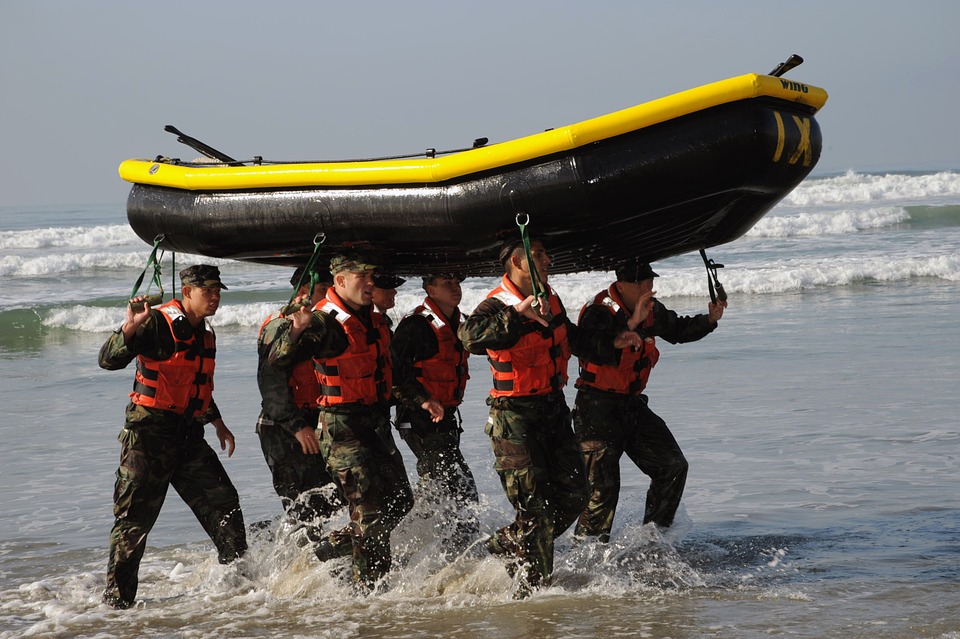Start off every day at 4 am by forcing everyone to jump in 50 degree water, roll around in the sand, and run 10 miles with a 6 foot tall, 250 lb tough-as-nails instructor yelling at you the entire time…or not.
I have noticed a penchant on the part of some folks that have no military experience to overemphasize military leadership techniques, or worse, to try to emulate them without any clue as to how they are being received. One notable character, a smart young HBS graduate who was appointed at the young age of 24 to be CEO of a venture funded startup, opined that “San Diego engineers don’t know how to work like Silicon Valley engineers” and that if his development team didn’t meet a deadline he would “put a gun to their heads”. Tough talk. Not particularly inspirational, however, in any environment.
- Creating a sense of esprit de corps. Everyone can strive to be the best at whatever it is that they do, whether it’s filing, bookkeeping, sales, or conducting military covert operations. Foster and develop the desire in people to excel in what they do and the morale of the entire team will improve. Take pride in being the best company, team, or department at “X”. By the same token, hold people to a high standard. If you tolerate mediocrity or unethical behavior your best performers will lose their willingness to excel accordingly. We had an incident in our company with an employee who was stealing office equipment from other employees and denying it. Get rid of those people, the faster the better.
- Competition. In the SEAL Teams every single PT (physical training) was a competition. When you ran as a group, you knew exactly who would normally come in front of you and who would come in behind you, and you were always trying to beat the guy in front of you and keep the guy behind you at bay. Healthy, friendly competition among co-workers in areas related to work helps build camaraderie and pride in one’s work. In our company we’ve had competitions for company logos, mottos and ideas for new business areas, in addition to physical competitions, both internally and externally. We have teams from the company compete in Mud runs, golf tournaments, lunchtime basketball games, the list goes on and on.
- Renaissance attitude. In other words, hire and develop the willingness to be a “Renaissance Person”, skilled in a variety of areas rather than simply a one-trick pony. Not everyone can be good at everything, but everyone can expand their skill sets and add more value to a company by doing so. This is particularly valuable in startup companies, but large companies can also benefit by having a workforce that can multi-task. I’ve hired people from big companies that were not able or willing to do anything outside of their job description in their offer letter (“they never asked me to do that at my old company…”). If they can’t change, they probably won’t fit in a startup.
- Understanding your people. When you’re deployed with someone for 6 months in a combat zone you get to know far more about that person than you ever would if you just worked with them in an office environment 8 hours a day. A good leader recognizes the differences and motivations of people and works with them individually to help them focus those motivations on a common goal. I try to meet with my direct reports and managers regularly to find out what motivates them and what they want out of their careers. Not surprisingly, this changes regularly. One of my folks who had aspired for years to manage a large team recently told me they wanted to go back to being an individual client service provider. It all worked out and the employee is happy again.
- Working out together. Not everyone is a fitness fanatic, but everyone can do some sort of exercise. The benefits to the individual and company are significant, and the act of engaging in strenuous physical activity together and the sense of accomplishment that comes with that are far greater than simply socializing at a happy hour or company picnic (though you should do those as well). This doesn’t approach the bonding that occurs in a foxhole when facing serious danger and a common enemy, but for a business it is a huge differentiator. One point here – make sure you include a variety of activities that everyone can participate in to some degree (Tai Chi is a good example, or walk/runs) so that you don’t have a clique of “jocks” develop to the exclusion of others. At Sentek we have a group of people that Cross-Fit together several times per week, often with our clients and prospective employees. I’ve had people say that one of the main reasons they joined Sentek was that we were all fit and worked out together. At a previous startup, another former SEAL, Mark Divine, ran the executive team through a SEAL style workout every morning.
I have tried to run my company, Sentek Global, from the beginning as I would a special operations unit. The benefits have been development of a team of people who take an extreme amount of pride in working for the company, to the point where they self-identify themselves as “Sentekians” and asked for company-branded workout clothes. As a recruiting and retention tool, the sense of esprit de corps that has developed has been an incredible differentiator from our competitors as well.





4 Responses
Love these!
Thank you Bob!
Eric,
I love this and come back to it from time to time. Keep inspiring.
-Macy
Thank you Macy!